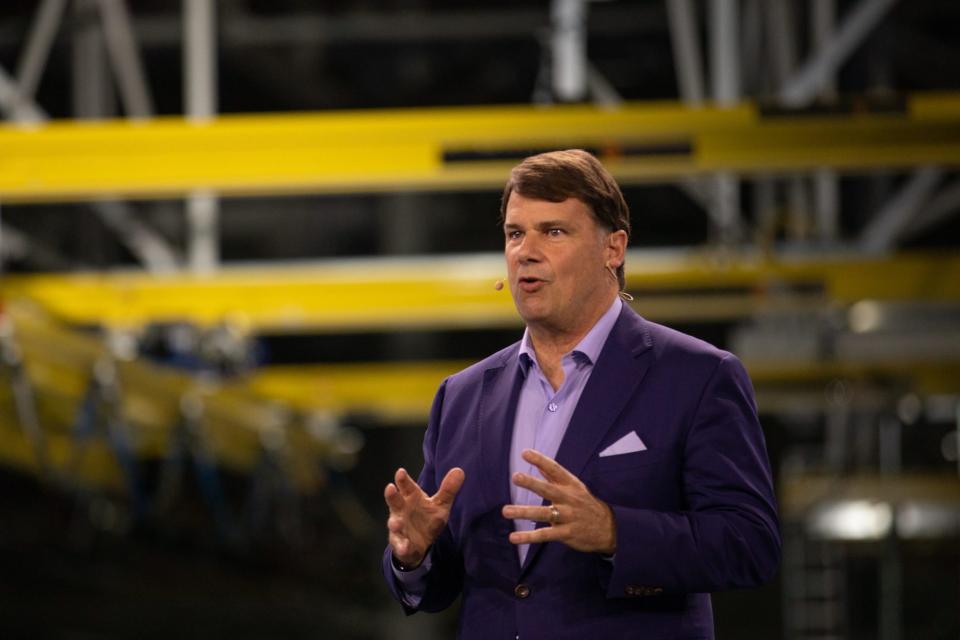Ford CEO, who’s been worrying about China’s EV dominance for years, says ‘the world has changed’ and he’d work with rivals on a cheaper battery

Ford CEO Jim Farley is worried about competition from China’s electric vehicle makers. Chief among the threats is BYD—backed by Warren Buffett’s Berkshire Hathaway—which can produce vehicles at significantly lower costs than industry norms, partly because it owns the entire supply chain for its batteries, which account for roughly 40% of a new EV’s price.
That kind of advantage is hard to beat, and it has Ford evaluating its battery strategy. On Thursday, Farley shared thoughts on how to address the challenge from China, suggesting some cooperation among rivals may be merited on battery production.
"We can start having a competitive battery situation,” Farley told attendees at an auto conference hosted by Wolfe Research on Thursday in New York, as reported by Reuters. “We can go to common cylindrical cells that could add a lot of leverage to our purchasing capability. Maybe we should do [this] with another OEM [automaker].”
He might well find receptive partners among his rivals—he’s not the only carmaker boss worried about BYD’s price prowess, after all.
“No one can match BYD on price. Period,” Michael Dunne, CEO of Asia-focused car consultancy Dunne Insights, told the Financial Times last month. “Boardrooms in America, Europe, Korea, and Japan are in a state of shock.”
Earlier this month, Farley told investors that Ford had “made a bet in silence two years ago” on a secret “skunkworks” team dedicated to creating a low-cost EV platform.
“It was a small group, small team, some of the best EV engineers in the world,” he said, “and it was separate from the Ford mothership. It was a startup.”
Leading that team—based in Irvine, California—is Alan Clarke, an EV engineer who spent a dozen years at Tesla before Ford hired him in 2022 as its executive director of advanced EV development. Members include engineers from Los Angeles–based Auto Motive Power (AMP), an energy management venture Ford acquired last year.
There’s never been any question about who Farley sees as the main competitive threat in the EV space. Speaking at a Morgan Stanley event last May, he said, "I think we see the Chinese as the main competitor, not GM or Toyota. The Chinese are going to be the powerhouse."
Chinese EVs ‘truly disruptive’
Ford has been scaling back its EV production ambitions amid weaker-than-expected demand—and putting more effort into hybrid models—but it remains committed to its long-term EV strategy.
Chinese EV makers, accused by EU regulators and others of benefiting unfairly from government subsidies, are expanding rapidly in Europe, Southeast Asia, and other markets around the world. High tariffs have kept them out of the U.S. so far, though American lawmakers fear they’ll use factories in Mexico as a back door, taking advantage of a North American free trade agreement.
Ford has operations in well over 100 countries, and it’s eyeing the international expansion of China’s EV makers warily.
"If you cannot compete fair and square with the Chinese around the world then 20% to 30% of your revenue is at risk" in the next several years, Farley said Thursday.
He added, "Last year, 25% of all vehicles sold in Mexico were sourced in China. The world is changing."
Farley noted BYD can produce its Seagull, a small EV model, for $9,000 to $11,000 in materials. The Seagull quickly became one of BYD’s top sellers in China after its debut last year, but it’s overseas where it can “be a truly disruptive force,” wrote market researcher Autovista Group.
Tesla, too, has its eye on BYD—which recently overtook it in global EV sales—and other Chinese carmakers.
“If there are no trade barriers established,” CEO Elon Musk told investors last month, “they will pretty much demolish most other car companies in the world. They’re extremely good.”
Hoping to better compete against both Chinese rivals and cheaper gas-powered cars, Tesla plans to start producing an entry-level EV starting at $25,000 next year.
Farley said he’s told his engineers to develop an affordable EV, "and you have to make money in the first 12 months. If you can't make money we aren’t launching the car."
This story was originally featured on Fortune.com

 Yahoo Finance
Yahoo Finance 